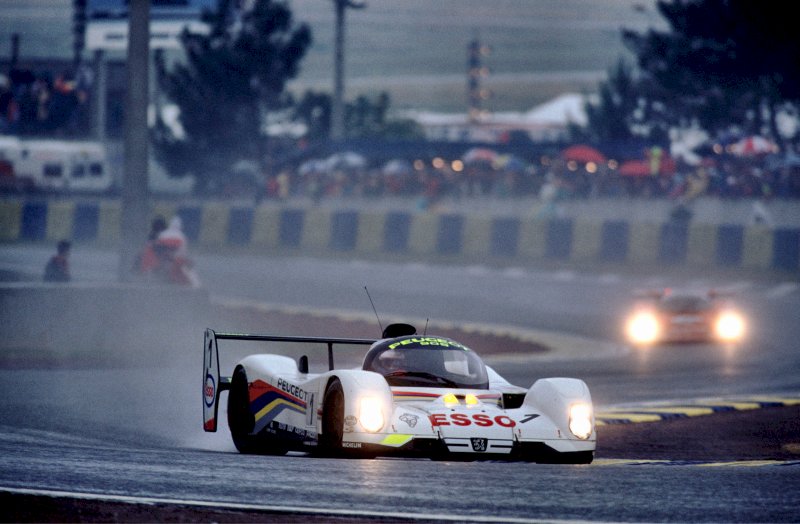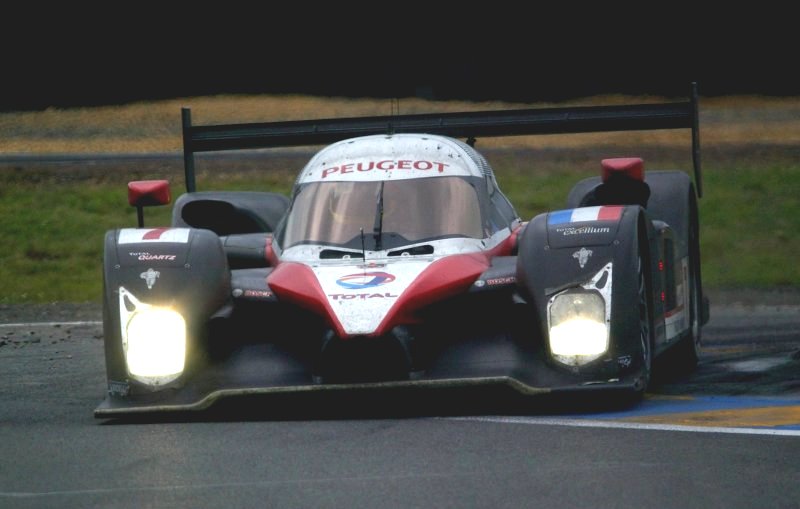Peugeot in Sportscar Racing
Peugeot had had a small involvement with the WM team at Le Mans through the late 70s and 80s, but they rose to sportscar prominence with the short lived 3.5 litre Group C regulations.

The Peugeot 905s in action
Despite initially underestimating Jaguar's response to the 3.5 litre Group C rules, Peugeot's response, the 905B, was the undoubted king of the 3.5 litre era after Jaguar's departure from the series. As well as taking victory in the WSC, they also won Le Mans in 1992 and 1993 and the Toyota competition was never really entirely competitive.
However, with the collapse of Group C the V10 engines went to F1, where they have been used by Jordan and McLaren and will be used by the Prost team in 1998.
Many believe that the 3.5 litre class was devised specifically to get Peugeot into F1, but it's indisputable that the 3.5 litre rules were the final nail in the coffin of Group C.
After a rather disappointing spell in F1 and returning to Rallying (highly successfully with the 206), Peugeot surprised many by announcing that they were returning to Le Mans in 2007 and unveiling a closed coupe with a diesel engine (Audi having already shown that the rules favoured diesel cars).

The Peugeot 908 in action at Le Mans in 2007
The 908 dominated the 2007 Le Mans Series (no Audis took part) and ran well in the 24 hours, with one car eventually finishing second.
They also ran at Sebring in 2008 and showed impressive pace, although the singleton entry encountered gearbox problems and lost around 20 laps.
It took a few attempts, but Peugeot finally beat Audi at Le Mans in 2010, before the German's bounced back in a dramatic 2011 race.
The Peugeots were generally faster and in 2011 dominated the Intercontinental Le Mans Cup (ILMC), although the racing was closer than the results suggest.
Peugeot were one of the first marques to commit to the new 'Hypercar' regulations with their distinctive 9X8.
Not quite as radical as Nissan's front engined LMP or the Deltawing, it featured no rear wing and equal sized wheels all around, both radically different to the competition.

Peugeot 908 in original form at Monza '23
Sadly, this version didn't prove that competitive against the Toyota and Porsche competition, although it showed moments of promise at the 2023 Le Mans and Monza races.
For 2024, the car was revised, now featuring bigger rear wheels and a semi-conventional rear wing.
The car was faster, but, in its first season at least, still lagged behind the leading competitors, Porsche, Toyota and Ferrari.

Peugeot 9X8 in updated form at Imola 2024
Back To The Sportscar Racing Page
